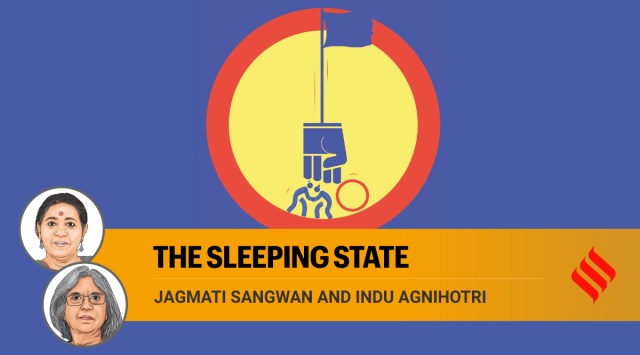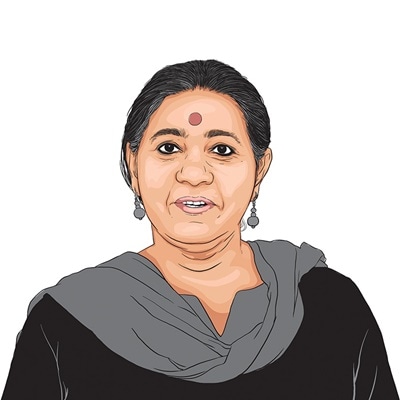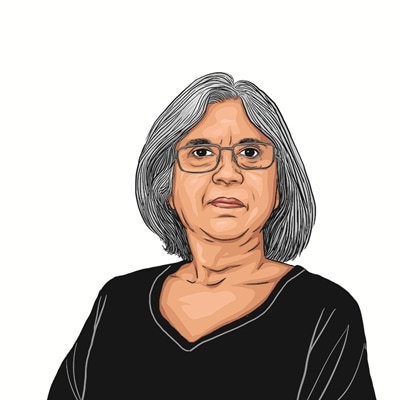What the wrestlers’ protest says about power and politics in India
An investigation into sexual harassment complaints against former WFI president and BJP MP Brij Bhushan Sharan Singh failed to be conducted despite protest by high profile sportspersons. The discouraging message it sends out is clear.
 Will the women sportspersons seeking justice in India witness a show of solidarity as displayed by the Iranian footballers who protested the death of Mhasa Amini? (Illustration by C R Sasikumar)
Will the women sportspersons seeking justice in India witness a show of solidarity as displayed by the Iranian footballers who protested the death of Mhasa Amini? (Illustration by C R Sasikumar) The fact that the SC had to issue a notice this week to the Delhi police for refusing to lodge an FIR on the complaint of sexual harassment by seven women wrestlers — including a minor — against the former WFI president and BJP MP Brij Bhushan Sharan Singh for over three days is extremely telling of the present scenario. The lack of response compelled a galaxy of top national- and international-level wrestlers to once again sit on a protest dharna at Jantar Mantar in the heart of the capital. This sequence of events underscores a point the women’s movement in India has been making for decades now: The State and its agencies are the biggest violators of the law, especially the laws enacted to ensure the rights of women, and the obstacles faced in initiating the process of seeking justice are so daunting that the majority opt out after their initial foray. Today this is compounded by the blatant misuse of official position and use of muscle power by the accused to intimidate and silence those speaking up.
The main factor underlying this state of affairs is the utter lack of political will to implement the law on the part of the state. This ensures that justice is neither certain, nor speedy and almost routinely denied. The result is that perpetrators of violence against women are never punished, nor are those responsible for implementing the law held accountable for their actions and inactions.
The ongoing protest at Jantar Mantar highlights the state of affairs in the institutional set up of the Wrestling Federation of India (WFI). In January 2023, a set of wrestlers first protested against Brij Bhushan Sharan Singh, the chief of the WFI citing incidents of sexual harassment, while also drawing attention to other irregularities. The government sought to defuse the situation by setting up an Oversight Committee which was to submit its report by the end of February. Until the wrestlers resumed their dharna on April 23, the findings of this report had not been shared with the complainants. A physiotherapist, Paramjeet Malik, has now said that three junior women wrestlers had confided in him about their ordeal and he had shared the information with the then women’s coach, Kuldeep Malik, but no action was taken. If raising their voices by some of the most high-profile sportspersons meet with such a fate, the message that goes out to those not-so-powerful is loud and clear: Never speak up. It is this that the intervention by the Supreme Court may hopefully challenge.
 Satya Pal Malik joined the wrestler’s protest at Jantar Mantar in New Delhi on April 26.
Satya Pal Malik joined the wrestler’s protest at Jantar Mantar in New Delhi on April 26.
Interestingly, in January, the protestors appeared keen to not “politicise” the issue. This is itself ironical, given that the top sports bodies in India are dominated by politicians or their scions, the most notable being the BCCI. The violators, both in the WFI case and that of the Haryana athlete who complained against Haryana minister Sandeep Singh in December, are themselves visible political faces and continue to hold positions in the party and the legislatures. As per reports, they continue to use their political clout to bully the complainants into silence, with several speaking of threats to life, character assassination and everyday harassment and disrespect in their place of work. This is in clear violation of the 2013 POSH Act and was taken cognisance of by the Supreme Court as far back as 1997 when the Vishaka Guidelines were issued. Undoubtedly, the establishment, with all its might, stands behind the accused in such cases.
Some of these aspects become clear from the trajectory of the complaint made by the Haryana athlete against Sandeep Singh: In his defence, the Chief Minister of Haryana went on record to state that such “allegations” do not make a person guilty; in the Assembly the Speaker observed that allegations are made only to be followed up with a compromise; while the Chairperson of the State Women’s Commission said the charges appeared “unbelievable”. All this while the Chandigarh police was still in the midst of its investigations! The media silence failed to register that after the accused minister publicly announced that he would probe the complainant’s character, the DGP Haryana, on December 24, on the basis of a complaint received from the accused himself, constituted an SIT. Further, what remains hidden from the public is the daily harassment — amounting to re-victimisation — that a victim undergoes at her workplace and in her daily life, subsequent to lodging a complaint of sexual harassment. Is all this being done as per POSH 2013? The nation truly needs to know.
 Indian wrestlers during the protest. (file)
Indian wrestlers during the protest. (file)
When complaints lodged by top-level national and international players who have won laurels for the country meet with such a fate, the signal that goes out to other women who suffer such violation of their rights is to remain silent. If this is not to happen, the issues raised by the wrestlers need wider support, failing which the few who have spoken up may once again be silenced and marginalised.
As political leaders show up at Jantar Mantar in their support, it is time to realise that the battle for women to live and work in dignity is as critical to the idea of India as that at the hustings.
Will the women sportspersons seeking justice in India witness a show of solidarity as displayed by the Iranian footballers who protested the death of Mhasa Amini and stood with their sisters in struggle, against the imposition of the veil?
Sangwan, a Bhim Awardee and former international volleyball player, is vice -president, AIDWA. Agnihotri retired as director, Centre for Women’s Development Studies, New Delhi









































